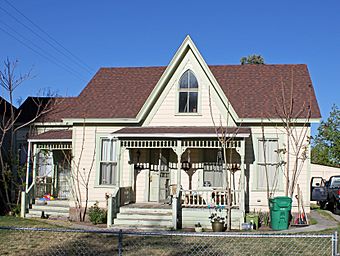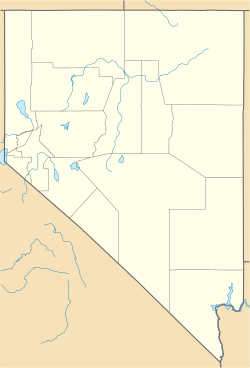Borland–Clifford House facts for kids
Quick facts for kids |
|
|
Borland–Clifford House
|
|
 |
|
| Location | 339 Ralston St., Reno, Nevada |
|---|---|
| Area | 0.3 acres (0.12 ha) |
| Built | 1885 |
| Architect | James Borland |
| Architectural style | Carpenter Gothic |
| NRHP reference No. | 83001114 |
| Added to NRHP | March 07, 1983 |
The Borland–Clifford House, also called the Clifford House, is a very old and special house in Reno, Nevada. It is known for its unique Carpenter Gothic style. This means it looks like a fancy wooden house, almost like a gingerbread house, with lots of detailed carvings and decorations. It's one of the few houses left in Reno that was built way back in the 1800s.
A House with a Long History
This historic house was built in 1885 by a man named James Borland. He owned it for many years, until 1902. Later, in 1907, a new owner named O. J. Clifford bought the house. The Clifford family lived there for a very long time, until 1984.
The Borland–Clifford House is so important that it was added to the National Register of Historic Places on March 7, 1983. This is a list of places in the United States that are worth saving because of their history. When it was first added, it was called the Clifford House. Later, in 2008, James Borland's name was also added to its official title.
A House on the Move
The Borland–Clifford House was one of the very first homes built in a part of Reno called the Western Addition Neighborhood. What makes this house extra interesting is that it has been moved several times! Imagine moving your entire house. It has been in different spots on Ralston Street, 4th Street, Arlington Avenue, and even Plumb Lane.
In 2018, the house was carefully taken apart. Then, it was moved piece by piece to a new spot in downtown Reno. This shows how much people wanted to protect this special old building.
Who Owned the House?
In 2018, a company bought the house. They later sold it to a person named Archie Granata. Even today, the Borland–Clifford House is owned by private individuals, not by the city or a museum. It continues to be a unique part of Reno's history.



